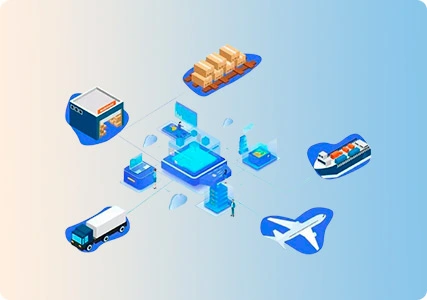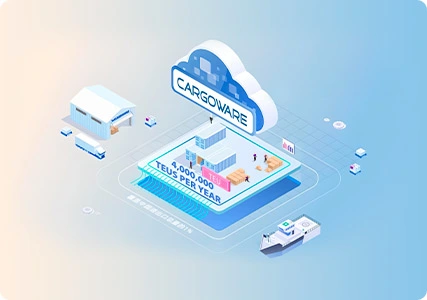
Digital logistics is a transformative approach that enhances and accelerates logistics processes, strategies, and systems by digitizing traditional data collection methods. Traditional data collection is often manual and susceptible to human errors and delays. By digitizing these processes, digital logistics automates routine aspects of the logistics chain that are suitable for automation.
This digital transformation not only unlocks new opportunities for businesses to achieve cost savings, minimize productivity losses, and ensure accurate order fulfillment, but it also promotes data transparency among all suppliers and partners involved in every stage of supply chain and operations management.
By using thoughtfully integrated enterprise logistics applications that collaborate and communicate through a central information system, all stakeholders have access to the information they need to make agile and informed decisions, even in the midst of the unexpected.
Advantages of Digital Logistics over Traditional Methods
Digital logistics and a digital supply chain provide businesses with a competitive edge over those relying on traditional logistics for their logistics management systems. Here are the key factors that make digital logistics more efficient than traditional approaches:
Streamlined Inventory Management:
1. Digital logistics enables businesses to optimize their inventory management processes. Unlike traditional logistics, which often lacks visibility into warehouse operations, digital logistics empowers logistics teams to enhance warehouse receiving, order fulfillment workflows, and storage and stocking practices. This optimization leads to improved inventory decision-making and overall efficiency.
2. Real-Time Flexibility:
Digital logistics excels at adapting to real-time situations more effectively than traditional logistics. For instance, if a product experiences declining sales, a company utilizing digital logistics can easily delay placing a purchase order if there is sufficient stock available. This real-time flexibility is unique to digital logistics and enables agile decision-making that traditional logistics cannot achieve easily.
3. Task Automation:
Digital logistics operations allow businesses to automate critical tasks such as inventory ordering to avoid stockouts. Additionally, repetitive tasks like data entry can be automated, eliminating the need for redundant data input across multiple systems, which is often required in traditional logistics. Task automation not only saves time but also reduces the risk of errors and enhances overall operational efficiency.
4. Continuous Improvement:
Digital logistics provides visibility into every step of the logistics process, enabling teams to identify root causes and bottlenecks. With this information, teams can develop effective solutions to overcome obstacles and improve efficiency. Traditional logistics, often characterized by siloed processes, makes it challenging to identify bottlenecks and implement targeted improvements.
Impact of Digital Logistics on Business Operations
The adoption of digital logistics is not only crucial for the long-term success of businesses in the digital age but also has a significant impact on customer service metrics and the company's bottom line. In fact, digital logistics has been attributed to an average cost saving of 35% and a remarkable 50% reduction in environmental footprint.
The next essential step is to integrate the new digital solution into the partner network. By leveraging modern technology and bringing key partners into the cloud, businesses experience enhanced flexibility across various areas, ranging from complex order management to streamlined accounting processes.
To fully capitalize on the benefits of digital logistics, it is crucial to embrace change and leverage the available data to one's advantage. With increased access to data, businesses should have a well-defined plan on how to utilize it effectively. Moreover, as employees are freed from monotonous tasks through the implementation of artificial intelligence and streamlined processes, they can be empowered to deliver an enhanced customer experience.
By embracing digital logistics, businesses can optimize their operations, improve customer service, reduce costs, and ensure sustainable growth in today's digital landscape.



.webp)





